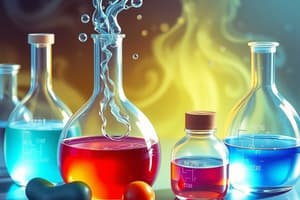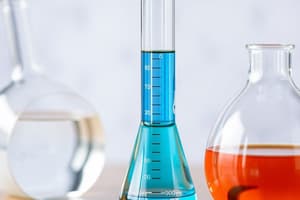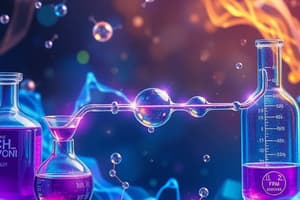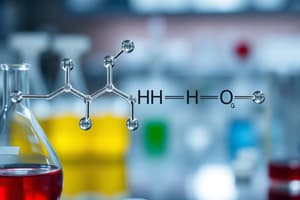Podcast
Questions and Answers
What is the state of matter characterized by having p+ and e-, and is greatly affected by magnetic fields?
What is the state of matter characterized by having p+ and e-, and is greatly affected by magnetic fields?
- Solid
- Gas
- Liquid
- Plasma (correct)
Which of the following properties is independent of the amount of matter present?
Which of the following properties is independent of the amount of matter present?
- Mass
- Volume
- Entropy
- Density (correct)
What is the process by which a solid changes directly into a gas?
What is the process by which a solid changes directly into a gas?
- Ionization
- Deposition
- Recombination
- Sublimation (correct)
Which of the following is an example of a homogeneous mixture?
Which of the following is an example of a homogeneous mixture?
What is the strength of intermolecular forces in the order of strongest to weakest?
What is the strength of intermolecular forces in the order of strongest to weakest?
Which law is related to the study of the fundamental properties of matter?
Which law is related to the study of the fundamental properties of matter?
What is the condition for spontaneity in a thermodynamic process?
What is the condition for spontaneity in a thermodynamic process?
Which law states that energy cannot be created or destroyed, only transformed from one form to another?
Which law states that energy cannot be created or destroyed, only transformed from one form to another?
What is the change in enthalpy (ΔH) a measure of?
What is the change in enthalpy (ΔH) a measure of?
What is the significance of the entropy of a perfect, solid, crystalline substance at absolute zero temperature?
What is the significance of the entropy of a perfect, solid, crystalline substance at absolute zero temperature?
What is the study of reaction rates and mechanisms called?
What is the study of reaction rates and mechanisms called?
What is the relationship between the rate of reaction and the rate constant (K) expressed in?
What is the relationship between the rate of reaction and the rate constant (K) expressed in?
What is the characteristic of symmetrical ethers?
What is the characteristic of symmetrical ethers?
What is the product of the oxidation of a secondary alcohol?
What is the product of the oxidation of a secondary alcohol?
What is the characteristic of epoxides?
What is the characteristic of epoxides?
What is the IUPAC nomenclature rule for aldehydes?
What is the IUPAC nomenclature rule for aldehydes?
What is a requirement for a compound to exhibit optical activity?
What is a requirement for a compound to exhibit optical activity?
What is the test for methyl ketones?
What is the test for methyl ketones?
What is the term for a species with a positively charged carbon atom?
What is the term for a species with a positively charged carbon atom?
What is the purpose of adding methanol to ethanol to make it unfit for human consumption?
What is the purpose of adding methanol to ethanol to make it unfit for human consumption?
What is the product of catalytic hydrogenation of alkynes using Lindlar's catalyst?
What is the product of catalytic hydrogenation of alkynes using Lindlar's catalyst?
What is the reagent used in Friedel-Craft's acylation?
What is the reagent used in Friedel-Craft's acylation?
What is the result of hydrating a terminal alkyne?
What is the result of hydrating a terminal alkyne?
What is the use of phenol, also known as carbolic acid?
What is the use of phenol, also known as carbolic acid?
What is the requirement for a compound to be considered aromatic?
What is the requirement for a compound to be considered aromatic?
What is the primary use of isopropyl alcohol?
What is the primary use of isopropyl alcohol?
What is the type of reaction that occurs in the nitration of benzene?
What is the type of reaction that occurs in the nitration of benzene?
What is glycerol used in the manufacture of?
What is glycerol used in the manufacture of?
What is the rule for determining the aromaticity of a compound?
What is the rule for determining the aromaticity of a compound?
Flashcards
Matter
Matter
Anything that has mass and occupies space.
Three states of matter
Three states of matter
Matter exists as solid, liquid, or gas.
Sublimation
Sublimation
Transition from solid directly to gas without becoming liquid.
Deposition
Deposition
Signup and view all the flashcards
Plasma
Plasma
Signup and view all the flashcards
Ions in plasma
Ions in plasma
Signup and view all the flashcards
Pure substance
Pure substance
Signup and view all the flashcards
Mixture
Mixture
Signup and view all the flashcards
Element
Element
Signup and view all the flashcards
Compound
Compound
Signup and view all the flashcards
Melting
Melting
Signup and view all the flashcards
Vaporization
Vaporization
Signup and view all the flashcards
Zeroth Law of Thermodynamics
Zeroth Law of Thermodynamics
Signup and view all the flashcards
First Law of Thermodynamics
First Law of Thermodynamics
Signup and view all the flashcards
Second Law of Thermodynamics
Second Law of Thermodynamics
Signup and view all the flashcards
Third Law of Thermodynamics
Third Law of Thermodynamics
Signup and view all the flashcards
Chemical Kinetics
Chemical Kinetics
Signup and view all the flashcards
Reaction rate
Reaction rate
Signup and view all the flashcards
Rate law
Rate law
Signup and view all the flashcards
Ethers
Ethers
Signup and view all the flashcards
Aldehydes and ketones
Aldehydes and ketones
Signup and view all the flashcards
Chirality
Chirality
Signup and view all the flashcards
Stereochemistry
Stereochemistry
Signup and view all the flashcards
Electrophile
Electrophile
Signup and view all the flashcards
Nucleophile
Nucleophile
Signup and view all the flashcards
Carbocation
Carbocation
Signup and view all the flashcards
Functional group
Functional group
Signup and view all the flashcards
Study Notes
Matter
- Matter can exist in three states: solid, liquid, and gas
- Sublimation is the transition from solid to gas, and deposition is the reverse process
- Recombination and deionization can occur in plasma
- Shape and volume of matter can be definite or indefinite
- Molecular motion is a key characteristic of matter
Plasma
- Plasma is the fourth state of matter, most abundant in the universe
- Has positively charged ions (p+) and negatively charged electrons (e-), affected by magnetic fields
- Examples: ionized neon light, aurora, stars, and sun
Classification of Matter
- Pure substance: a sample of matter with constant composition and properties
- Mixture: a physical combination of two or more substances, separated by physical means
- Element: the simplest form of a substance, cannot be broken down further
- Compound: a substance composed of two or more different elements, combined through chemical means
Phase Changes
- Change in state from solid to gas is sublimation
- Change in state from gas to solid is deposition
- Change in state from solid to liquid is melting
- Change in state from liquid to gas is vaporization
Thermodynamics
- Zeroth Law of Thermodynamics: two systems in thermal equilibrium with a third system are also in thermal equilibrium with each other
- First Law of Thermodynamics: energy is conserved, not created or destroyed, but can be transformed from one form to another
- Second Law of Thermodynamics: entropy of an isolated system always increases over time
- Third Law of Thermodynamics: entropy of a perfect, solid, crystalline substance is zero at absolute zero temperature
Chemical Kinetics
- Study of reaction rates and mechanisms
- Reaction rate: change in concentration of a reactant or product with time
- Rate law: expresses the relationship of the rate of reaction to the rate constant and concentration of reactants
Organic Chemistry
- Ethers: a class of organic compounds with an oxygen atom bonded to two alkyl or aryl groups
- Aldehydes and ketones: classes of organic compounds with a carbonyl functional group
- Chirality: the existence of non-superimposable mirror images of a molecule
- Stereochemistry: the study of the three-dimensional arrangement of atoms in a molecule
Functional Groups
- Electrophile: an electron-deficient species that seeks electrons
- Nucleophile: an electron-rich species that donates electrons
- Carbocation: a species with a positively charged carbon atom
- Functional group: a specific group of atoms in a molecule that determines its chemical reactivity
Studying That Suits You
Use AI to generate personalized quizzes and flashcards to suit your learning preferences.




